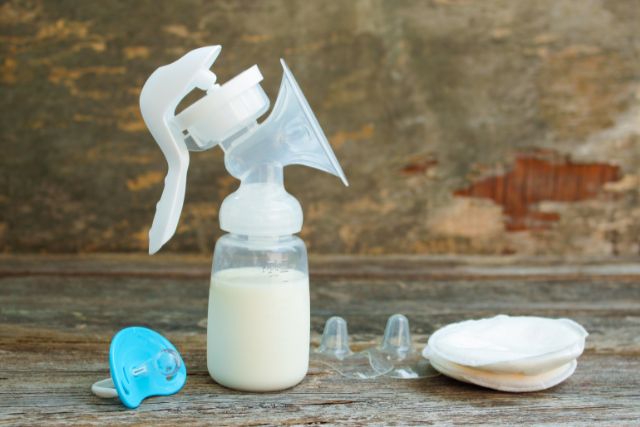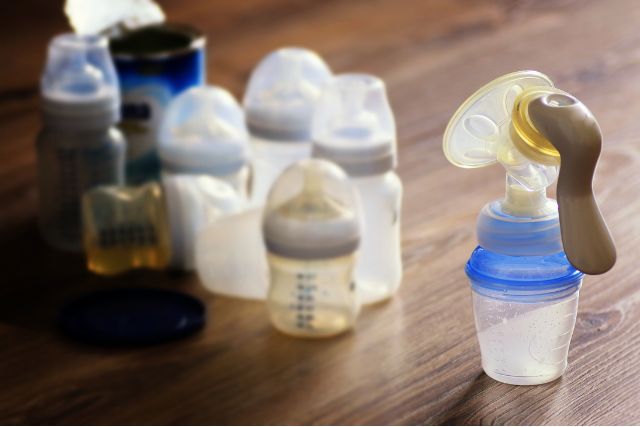Breastfeeding is never an easy mission. After childbirth, most moms experience a delay in milk letdown. And even when it finally starts trickling a few days later, maintaining the consistency of the flow is never guarantied.
One day you’re in abundance, while the following day, your breast can hardly make enough milk supply for your little one.
And you may be wondering,
Is there something you can do to increase your milk supply? or
What negatively affects breast milk supply?
This post is about simple reasons you do not have enough breast milk supply and what you can do to improve your milk flow.
Let’s dive right in.
What Is The Most Common Cause of Insufficient Milk Supply?
1. You are not eating the right food for milk production
Not everything you consume is suitable for milk production. You eat some types of foods, and they dry out or lower your milk production. Similarly, there are other foods you include in your diet and instantly feel a boost in milk production.
Incorporating foods like oatmeal into your daily diet can enhance your breast milk supply. Accordingly, the Canadian breastfeeding foundation herbs like fenugreek, fennel seeds, fresh ginger roots, and brewer’s yeast can boost your breastmilk production.
Also, ensure your diet is well balanced and regularly includes proteins like lean meat, fish, and poultry for a boost in milk supply. Carbohydrates and vitamins are also needed to help you stay strong and healthy.
Additionally, some drinks can negatively affect breast milk supply. Cut on drinks like carbonated beverages, caffeine, and alcohol.
Some herbal tea like peppermint, chaste berry, and parsley teas is also thought to hinder a good supply of breastmilk; thus, you must take precautions if you have to take them.
Related: 9 Basic Tips For Increasing Your Breast Milk Supply
2. Insufficient Glandular Tissue
The glandular is the tissue responsible for making breast milk. According to the Australian Breastfeeding Association, the amount of milk you make is affected by the amount of glandular tissue in your breast.
While most women develop enough of these tissues at some point in their life, some moms do not have sufficient glandular tissues.
You may experience insufficient glandular tissue if your breasts do not develop normally for reasons like endocrine disorders, genes or if you’ve had breast surgery.
This is not to worry you, though.
The likelihood of your breast ducts growing during pregnancy is high. And consistent breastfeeding also stimulates the growth of more glandular tissue.
As such, you may experience less of this issue with a second or third child if your IGT condition is minor.
Meanwhile,
- Try nipple stimulation techniques before your baby arrives.
- After birth, make sure you start breastfeeding your newborn as soon as possible
- Skin-to-skin contact is highly recommended, including having frequent feeds
- You may consult a lactation specialist in case your milk is completely down for a professional advice
- You may also think of a supplement like incorporating formula to satisfy your baby.
As you seek help, ensure you continue breastfeeding your baby with the little milk you can produce. Breastmilk is key to supporting a baby’s immunity, brain development and fulfilling their nutritional needs.
Affiliate Disclosure: As an Amazon Associate, I get a small commission for purchases made from Amazon.com through links in this post. Learn more about our affiliate disclaimer here.
3. You are not adding a milk booster in-between your meals
As a breastfeeding mother, your body’s demands for food and nutrients are pretty high. As your baby grows, so does the demand for breast milk. As such, you must be intentional about your breast milk production.
Apart from your regular meals, ensure you take a lactating cookie or a lactating smoothie to boost your milk production.
Munch your mother’s milk cookies and drink herbal teas that are thought to increase milk production between meals.
The main ingredient in these lactation snacks is fenugreek, a seed thought to boost breast milk supply and is also available as a supplement.
Dark Cadbury chocolate drink is also great for enhancing milk supply. Be sure to have your cup at least once daily for a good milk letdown.
Other recommended lactational snacks or drinks include;
4. You are not mentally aligned for breastfeeding
Stress and anxiety are among the leading cause of low breast milk supply for new moms. In the first few weeks after childbirth, you may struggle with nipple crack pains, sleepless nights, and postpartum issues.
All these factors may result in baby blues or possible stress negatively affecting breast milk supply
Also, some women have reported suffering from dysphoric milk ejection reflect.
According to research, DMER is a physical condition breastfeeding mothers experience when there is a drop in dopamine, a hormone associated with reward.
Naturally, Dopamine hormone drops in breastfeeding women to pave the way for the rising prolactin-milk-producing hormone. If this hormone drops excessively, you may suffer a range of symptoms, including anxiety, low mood, anger, and a feeling of hopelessness, factors that interfere with milk production and letdown.
To be safe.
Have positive self-talk about the importance of breastfeeding for you and your baby. When you’re in despair, continue affirming that even though motherhood is challenging, you’ll still make it.
Also, involve friends and professional caregivers if your stress does not go away after a few months of breastfeeding.
Related:9 Essential Breastfeeding Tips To Help New Moms Start Off From Day One
5. You are repeatedly using the wrong breastfeeding techniques
Finding a proper latching for your newborn can be challenging for first-time moms, yet it’s among the best breastfeeding techniques that ensure good milk letdown.
It is even worse if you’ve not attended birth classes where you are oriented into motherhood and breastfeeding practices before the baby’s arrival.
A poor breastfeeding latch is uncomfortable and may give you sore nipples. Often your baby cannot completely drain your breast, leading to low milk supply, poor weight gain, and increased risk of mastitis.
When latching, ensure your baby’s chest and stomach rest against your body. This will leave their head in a straight position and not turned to the side. Allow your baby’s chin to touch your breast with its mouth widely open around your breast, not just the nipple.
Similarly, wrong milk expression techniques or the wrong breast pump choice can result in low milk production.
How you hold your breast when expressing determines the amount of milk you can extract at a go. The intervals of pressing and releasing are also very crucial.
When buying a breastfeeding pump, try to check the ease of use and the strength or variability of its suction power. This, too, will affect your breastmilk production or the ability to store it for future consumption.
6. You are not breastfeeding long enough
The duration your baby spends at the breast determines the stimulation level and subsequent amount of breast milk you can produce.
One study shows that the length and frequency of feeding can decrease nipple pain, breast tenderness and significantly increase milk output.
Allow your baby to suckle for at least 10 minutes on each breast or per session before removing them.
You may also wait until they spontaneously release the nipple. If they fall asleep soon after they start feeding, you may wake them up gently to continue nursing.
Another research shows that breastmilk production is also controlled by a substance called the feedback inhibitor of lactation, or FIL (a polypeptide).
This FIL substance in breast milk can control milk production independently within each breast.
For instance, if you continually breastfeed your baby on one side, the other breast can stop making milk. This happens because, due to lack of stimulation, this inhibitor stops the cells in that particular breast from secreting or making milk to help protect the breast from the harmful effect of being full.
To maintain a consistence flow of your breastmilk supply;
- Ensure your baby nurses on-demand and for a long time.
- Express breast milk in between the nursing session to create a demand.
- If you are comfortable nursing on a particular breast, always ensure you pump or express milk from the other breast to relieve pressure and enhance the continuity of milk production.
7. You have introduced formulae supplements way too early
The quantity of breastmilk production acts pretty much like the law of demand and supply. The more you breastfeed, the higher the supply.
Exclusively breastfeeding in the first few months drives higher demand, so the breasts create more milk.
However, supplementing with formula or other food too early can lead to a reduction in supply. If your baby is not consistently breastfeeding, maybe because they have taken something else, your milk supply will begin to decrease.
You can protect your milk supply by pumping or expressing at regular daily feeding intervals.
Regular milk expression tells the body to continue producing, even if the baby isn’t sucking at that moment. You may store your expressed milk in the freezer for future use.
Additionally, ensure you give as many breastfeeding sessions as possible whenever you have a chance.
8. Too much use of nipple shields when breastfeeding
Nipple shields are made to act as a barrier between you and your baby. They work like a second nipple allowing your baby to suckle without directly contacting your breast.
The nipple shield was meant to help newborns with latching difficulties learn to breastfeed effectively without first hurting you.
By acting like a long and firmer nipple, the shield can be a good training ground for your little one. A woman with nipple cracks can also use the shields while breastfeeding to help reduce the nipple pains.
However,
Incorrect use or wrong choice of a nipple shield may reduce milk supply. According to lactation consultants, breastfeeding naturally (skin-to-skin contact between your baby’s mouth and your breast) stimulates your body to make hormones that keep up your milk supply.
And by introducing a barrier between your baby’s mouth and your areola, you interfere with the natural milk stimulation process
It’s also challenging to wean a baby from a nipple shield. They hardly empty your breast, and may become too dependent on them.
Infact, one study shows that there is slightly less milk transfer when using a breast shield, leading to mastitis in the long run.
How long can I use a nipple shield?
According to lactation consultants, a nipple shield should only be used for a few weeks as you train on latching or when suffering from nipple cracks.
Once the baby can latch properly, it is no need to continue using it. Dr. Malemba of St. Gertrudes Women’s Hospitals advises new moms not to use the nipple shield for more than two weeks. “The longer you get used to a nipple shield, the harder it becomes to stop using it, yet it can disrupt your milk supply,” he says.
Related: 13 Natural Remedies To Heal Cracked Nipples First When Breastfeeding
9. Indulging in an unhealthy lifestyle
Your daily lifestyle can significantly impact your ability to breastfeed satisfactorily.
If you’re constantly fatigued from overworking or performing heavy duties that drain your energy, you can experience a reduction in your breast milk supply.
Also, drinking too much alcohol, using nicotic drugs, and heavy smoking can decrease your milk production.
According to the Centers for Disease control and prevention, avoiding alcoholic drinks while breastfeeding is the best option. However, if you must consume, ensure that you drink moderately and do not exceed one standard drink per day.
Too much alcohol not only affects the quantity of your breast milk but has proved to affect the baby’s sleep patterns and early development.
10. Taking certain medications
According to Mayo Clinic, almost every medicine you take which goes through your bloodstream will transfer into breast milk. The degree of effect on you and your baby is what differs.
While most medications do so at low levels and subsequently pose minimal or no risk to your baby, the reverse is also true. Other drugs can be high in breast milk and may affect your baby.
For instance,
IABLE Institute notes that women suffering from specific allergic reactions when put on high-dose steroids and strong antihistamines for treatment are likely to experience a noticeable drop in their milk supply.
As such,
When taking certain medications, watch your baby closely for any changes, especially in the first few days. You may want to monitor any changes in eating, sleeping habits, temperature, fussiness, or the presence of a rash.
Also, check whether your breast milk supply has been affected. In case of any anomalies, please do not hesitate to contact your professional healthcare provider for further extermination.
11. Using certain hormonal birth control
Many women complain about reduced breast milk production after using certain hormonal birth control. According to a study, the use of combined oral contraceptives may lead to a reduction in breast milk supply.
Using traditional birth control pills that combine estrogen and progestin hormones in the first few weeks after birth may interfere with your milk supply and, consequently, a shorter duration of breastfeeding.
According to this study, you may want to avoid using combined oral contraceptives if you are on exclusive breastfeeding.
You may choose to use non-hormonal birth control methods like condoms or go for progestin-only contraceptives, which is preferable during the first few months because they have no significant effect on breastfeeding.
Take away
Things that affect milk supply are many. However, your breast milk production naturally operates on the law of demand and supply. The more your express or allow your baby to suckle, the more milk your breast will make. To increase your milk supply, establish your production in the first few weeks after birth. Afterward, monitor closely any changes that may occur and adjust appropriately.
up next
13 Worrisome Things To Avoid For Better Baby Development
7 Unwritten Baby Routines That Sustained My Sanity In the First 3 Months After Birth
Simple Daily Practices To Ensure Your Baby’s Umbilical Cord Heals Faster



